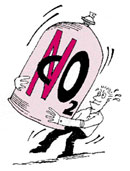A no to yes
A no to yes

the role of the Dutch as pioneers in international environmental policy seems to have been relinquished. The question of reducing carbon dioxide (co2) emissions to three per cent below the 1990 levels by the year 2000, is under debate in the Netherlands.
Although climate change was a hot issue in the country throughout 1996, severe policy measures to combat the problem seem distant. The Dutch Parliament appointed a special committee to study climate change and offer suggestions as to the steps to be taken to curb it. The final report of the committee was unanimous about the seriousness of the problem and even announced that it may be possible to reduce emissions to 30-40 per cent below the 1990 standards. But there were disagreements about the manner in which to go about the reductions. Some Dutch politicians recommended nuclear energy as a cleaner alternative to fossil fuels but the decision to close down one of the two Dutch nuclear power stations has subdued their voices.
Government memorandums on environment and energy with respect to climate change clearly indicate the cold feet the Dutch authorities are developing with respect to cuts in emissions. The first of these memorandums was presented by the minister of economic affairs. The most important measure he suggested was saving power through energy efficiency, of achieving a 33 per cent reduction of power consumption in 25 years. But he also recommended an economic growth rate of 75 per cent for the very same period. Wisely enough, he never mentioned either the absolute energy consumption levels or the co2 levels he expects.
The official stand may adhere to a stabilisation of emissions after the year 2000, but a particular statement made by the minister indicates possible backtracking. He said that "if all countries adopt an every-man-for-himself attitude, the Netherlands might cancel its stabilisation targets.
' The minister of environmental affairs also presented her views on climate change. She seemed to be somewhat more progressive than her colleague. In order to meet the reduction targets, she proposed international agreements on more efficient cars, an international system of energy taxation and taxing airplanes for the use of fuel. However, the minister admitted her relatively weak position within the government. She stated that the ministers of economic and financial affairs were not in favour of the Dutch taking an exceptional stand within the European Union. She reiterated the fact that in the absence of an international agreement, the Dutch would not be bound to reduce co2 emissions.
Green groups are rather unhappy with this stand taken by the Dutch. They are not very impressed by the government's plans of spending us $440 million for reducing emissions since a Royal Institute of Public Health and Environmental Protection estimate puts the expenditure at us $590 million for every year upto 2000, to reach the official target of co2 emissions at three per cent below the 1990 levels. Moreover, a majority in the Dutch Parliament do not agree with the government that progress in the country's climate policy should so heavily hinge on developments abroad. They have adopted a motion in the Parliament which declares that the Netherlands should stabilise its emissions of the gas by the year 2000, irrespective of the internatio-nal community standing by the commitment.







